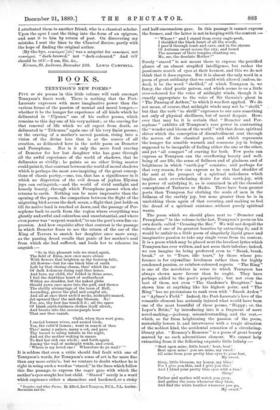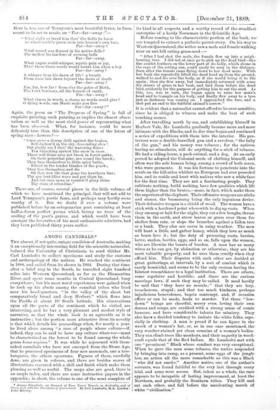BOOKS.
TENNYSON'S NEW POEMS.*
FIVE or six poems in this little volume will rank amongst Tennyson's finest work. There is nothing that the Poet-
Laureate expresses with more imaginative power than the various forms of the passion of mental and moral hunger,— whether it be the hunger for experience of all kinds which he delineated in "Ulysses," one of his earlier poems, which remains to this day one of his very noblest; or the craving for
that renewal of life which we all expect from .death, as delineated in " Tithonus," again one of his very finest poems; or the craving of a mother's sacred passion, rising into a vision of the divine love that is at the source of all creation, as delineated here in the noble poem on Demeter
and Persephone. Nor is it only the mere fond craving of Demeter for her lost daughter who has gone through all the awful experience of the world of shadows, that he delineates so vividly ; he paints as no other living master onld paint it, that contrast between the world of moral shadows which is perhaps the most awe-inspiring of the great concep- tions of classic poetry,—one, too, that has a significance in it which no dispersion of the evil dream of joyless Elysian joys can extinguish,—and the world of vivid, sunlight and homely beauty, through which Persephone passes when she returns to earth. Nothing can be more impressive than the opening of the poem, the comparison between the flight of the migrating bird across the dark ocean, a flight that just holds on till its native land is reached at dawn, and the passage of Per- sephone back to earth from the region where everything was ghostly and awful and colourless and unsubstantial, and where .even power was " serpent-wanded," to use the poet's own fine ex- pression. And how exquisite after that contrast is the passage in which Demeter fears to see the return of the car of the King of Terrors to snatch her daughter once more away, as the passing dread recalls that panic of her mother's soul from which she had suffered, and leads her to rehearse its anguish :—
"So in this pleasant vale we stand again,
The field of Enna, now once more ablaze With flowers that brighten as thy footstep falls, All flowers—but for one black blur of earth Left by that closing chasm, thro' which the car Of dark Aidoneus rising rapt thee hence.
And here, my child, tho' folded in thine arms, I feel the deathless heart of motherhood Within me shudder, lest the naked glebe Should yawn once more into the gulf, and thence The shrilly whinnyings of the team of Hell, Ascending, pierce the glad and songful air, And all at once their arch'd necks, midnight-maned, Jet upward thro' the mid-clay blossom. No!
For, see, thy foot has touch'd it ; all the space
Of blank earth-baldness clothes itself afresh, And breaks into the crocus-purple hour
'That saw thee vanish.
Child, when thou wert gone, I envied human wives, and nested birds, Yea, the cubb'd lioness ; went in search of thee Thro' many a palace, many a cot, and gave Thy breast to ailing infants in the night, And set the mother waking in amaze To find her sick one whole ; and forth again Among the wail of midnight winds, and cried, Where is my loved one? Wherefore do ye wail ? "
It is seldom that even a critic should find fault with one of Tennyson's words, for Tennyson's sense of art is far more fine than any mere critic's; but we venture to doubt whether he is
right in using such a word as "stared," in the lines which follow this fine passage, to express the eager gaze with which the mother's eyes sought her lost child. " Stared " surely is a word which expresses either a shameless and hardened, or a stony
* Demeter, and other Poems. By Alfred, Lord Tennyson, D.O.L., P.L, London ; hiaemitlan and Co.
and half-unconscious gaze. In this passage it cannot express the former, and the latter is not in keeping with the context :— " Where ' and I stared from every eagle-peak,
I tliridded the black heart of all the woods, I peer'd through tomb and cave, and in the storms Of Autumn swept across the city, and heard The murmur of their temples chanting me, Me, me, the desolate Mother !"
Surely " stared " is not meant there to express the petrified glance of an almost stupified intelligence, but rather the passionate search of eyes at their keenest, and this we do not think that it does express. But it is almost the only word in a poem of great sublimity that we could wish altered (unless, in- deed, it be the word "shrilled," of which Tennyson is, we fancy, the chief poetic patron, and which seems to us a little over-coloured for the voice of midnight winds, though it is exactly appropriate to the voice of Sir Gawain's ghost in "The Passing of Arthur," to which it was first applied. We do not mean, of course, that midnight winds may not be "shrill," but that the verb "to shrill" expresses to our ears something not only of physical shrillness, but of moral despair. How- ever that may be, it is certain that " Demeter and Per- sephone" exhibits all Tennyson's rare power in contrasting the "wonder and bloom of the world " with that drear, spiritual shiver which the conception of disembodiment sent through the nerves of the classical poets, and which represents the hunger for sensible warmth and sensuous joy in beings supposed to be incapable of feeling either the one or the other, and yet "all compact" of craving for both. Few poets can express as Tennyson can the overflowing beauty and well- being of our life, the sense of fullness and of gladness and of brightness in which "earth-joy" consists ; and perhaps for that very reason, few can express as he can that shudder of the soul at the prospect of a spiritual nakedness which implies such overwhelming desire for this earth-joy, with no power of satisfying it, as is contained in all the classical conceptions of Tartarus or Hades. There have been greater poets than Tennyson for clothing the souls of men in the fullness of the earthly joy, but none greater than he is in unclothing them again of that covering, and making us feel the dread of a spiritual existence .without purely spiritual wants.
The poem which we should place next to "Demeter and Persephone" in the volume is the last, Tennyson's poem on his own death, called "Crossing the Bar." We will not despoil the volume of one of its greatest beauties by extracting it; and it would be unfair to a little poem of singularly liquid grace and imaginative passion to take any single verse from its context. It is a poem which may be placed next the loveliest lyrics which Tennyson has ever written, and not seem their inferior; indeed, we can imagine its being preferred even to "Break, break, break," or to "Tears, idle tears," by those whose pre-
ference is for crystalline loveliness rather than for highly condensed passion, or rainbow-coloured regrets. "The Ring" is one of the novelettes in verse to which Tennyson has always shown more favour than he ought. They have perhaps added to the poet's popularity ; but not even the best of them, not even "The Gardener's Daughter," has shown him at anything like his highest point, and "The Ring" has no pretensions to rank even with "Enoch Arden" or " Aylmer's Field." Indeed, the Poet-Laureate's love of the romantic element has seriously injured what would have been. one of the most beautiful of these• poems, "Happy; or, the Leper's Bride," by introducing into it a fragment of mere
novel-making,—jealousy, misunderstanding, and the rest,—
which, so far from heightening the passion of the poem, materially lowers it, and interweaves with a tragic situation
of the noblest kind, the accidental sensation of a circulating. library plot. " Romney's Remorse" is a poem of great beauty marred by no such adventitious element. We cannot help extracting from it the following exquisite little lullaby :—
" Beat upon mine, little heart ! beat, beat ! Beat upon mine ! you are mine, my sweet !
All mine from your pretty blue eyes to your feet, My sweet.
Sleep, little blossom, my honey, my bliss !
For I give you/this, and I give you this ! ,
And I/ blind your pretty blue eyes with a kiss ! ,
Sleep !
Father and mother will watch you grow, And gather the roses whenever they blow, And find the white heather wherever you go,
My sweet."
Here is, too, one of Tennyson's most beautiful lyrics, in lines, meant to be set to music, on "Far—far—away :"— " What sight so lured him thro' the fields he knew As where earth's green stole into heaven's own hus, Far—far—away ?
What sound was dearest in his native delis? The mellow lin-lan-lone of evening bells Far—far—away.
What vague world-whisper, mystic pain or joy, Thro' those three words would haunt him when a boy Far—far—away ?
A whisper from his dawn of life ? a breath From some fair dawn beyond the doors of death Far—far—away ?
Far, far, how far ? from o'er the gates of Birth, The faint horizons, all the bounds of earth, Far—far—away ?
What charm in words, a charm no words could give ? 0 dying words, can Music make you live Far—far—away ?"
Again, the poem on "The Progress of Spring" is full of exquisite painting, such painting as implies the closest obser- vation as well as the most vivid power of representing what has been observed. What, for instance, could be more delicately true than this description of one of the latest of spring snow-lhowers ? — "Once more a downy drift against the brakes,
Self-darken'd in the sky, descending slow But gladly see I thro' the wavering flakes Yon blanching apricot like snow in snow.
These will thine eyes not brook in forest-paths, On their perpetual pine, nor round the beech ; They fuse themselves to little spicy baths, Solved in the tender blushes of the peach ; They lose themselves and die On that new life that gems the hawthorn line ;
Thy gay lent-lilies wave and put them by,
And out once more in varnish'd glory shine Thy stars of celandine."
There are, of course, several pieces in the little volume, of which we have mentioned the principal, that will not add to Lord Tennyson's poetic fame, and perhaps may hardly seem worthy of it. But we doubt if ever a volume were published before by an octogenarian poet containing at least half-a-dozen perfect poems which betray no trace of the cooling of the poet's genius, and which would have been amongst the favourites of his most enthusiastic admirers, had they been published thirty years earlier.











































 Previous page
Previous page